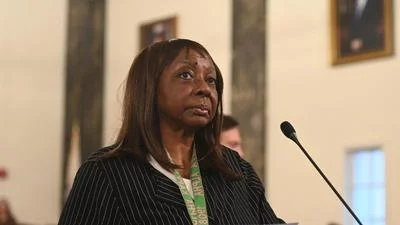Brandon Johnson | City of Chicago
Brandon Johnson | City of Chicago
The attempt to electrify Chicago's new housing market through a progressive decarbonization proposal will not result in lower heating costs for consumers, say opponents of the "Clean and Affordable Buildings Ordinance," introduced last month.
Some also say that fossil fuel emissions could actually increase when replacing natural gas with electric systems.
Sponsored by Mayor Brandon Johnson and supported by 14 Chicago aldermen, the proposal - which remains pending - would set emissions standards in new buildings to levels that would prohibit fossil fuel combustion.
Johnson said in a statement that "too many Chicagoans are having trouble paying their gas bills, and too many families are exposed to chemicals that cause cancer and asthma when burning gas in their kitchen."
Among opponents are Alderman Gilbert Villegas (36) who seeks a better understanding of costs related to the transformation.
Villegas has filed a resolution calling for an analysis of converting buildings from natural gas to electric for heating and cooking systems in Chicago. He also wants a hearing on the proposal.
"Make no mistake, Chicago must work to reduce its carbon footprint," Villegas stated in a Jan. 22 press release. "But, during the winter's frigid temperatures, where tens of thousands of Chicagoans were left without electricity, now is the worst possible time to hastily slam through an ordinance without examining true costs, infrastructure requirements, and, most importantly, hearing from residents."
Other stakeholders have expressed doubt over the reliability of electric systems to heat the predictably frigid city in the winter, as well as the prospect of reducing emissions.
Chicago gas distributor The Peoples Gas Light and Coke Co. said in an email that the ordinance would "increase costs and risk reliability for everyone, especially during the coldest days of the year," according to an S&P Global Market Intelligence article.
"Chicago may see emissions go up under this plan," the article said, quoting the Peoples Gas email. "The grid that powers Chicago uses coal and natural gas to keep the lights on. Renewable energy accounts for less than 4% on any given day."
Chicago area residential developer Marty Paris remarked on the inefficiency of electric heating systems.
"We have built hundreds of units in the Chicago metro area and rarely have employed electric heating systems," Paris said.
"When we have, the energy cost to operate the heating system was three to five times more to heat with electricity versus gas. In extreme cold, electric heat often could not generate enough heat to meet a 68 degree interior temperature. And cost differential increased exponentially in extreme temperatures.
"Outlawing fossil fuel heating will have significant financial consequence to the financially disadvantage which will disproportionately impact minorities."
Also lining up against the ordinance are the Building Industry Association of Greater Chicago, the Southland Black Chamber of Commerce and Industry and energy infrastructure company NPL Construction Group.
Chicago joins other progressive cities - San Francisco, Seattle and New York - in the march toward electrification by banning gas stoves and appliances in new construction.
Former President Donald Trump's response to the push by progressives for gas stove bans and electric vehicle use was, "I think maybe they're mixed up, or confused," when asked by Fox News anchor Laura Ingraham whether there exists a bigger agenda to control peoples' freedom.






 Alerts Sign-up
Alerts Sign-up